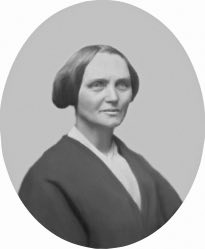During her lifetime, Abby Kelley Foster followed the motto, “Go where you are least wanted, for there you are most needed.”

Photo from the National Women’s Hall of Fame.
Dear AllY,
As humans, what is more of our natural impulse? To protect ourselves and our comfort or to embrace change? Reflecting on times that I stepped up in the spirit of allyship, there is one thing that surprises me most. When overcome by the compulsion to intervene, my own well being was not necessarily taken into consideration. When I reflect on the state of today’s socio-cultural climate, as it relates to racial diversity, it seems to me that the insistence on comfort might be our greatest barrier to collective social advancement. Indeed, the legacy and culture of racial division has been normalized and continues to be pervasive. What does it mean to sacrifice one’s own personal comfort and privilege, for the sake of inclusivity? To most it seems an unlikely sacrifice, especially when there is little to no personal benefit in creating opportunities for disenfranchised communities. As we continue to advocate the importance of allyship across cultural communities, it is important to look towards models of allyship in history.
I recently came across a fascinating compilation of examples of allyship at True White Allies; the Forgotten History of White Anti-Racists. The website explores a few examples, both British and American people who actively fought for the abolition of the Slave Trade and the horrible institution itself. The site shares stories of people who sought in their own creative ways to improve the lives and conditions of brown people, sometimes at the expense of their social standing and personal well being. One example of bravery and allyship that stands out to me was that of Abby Kelley Foster, a woman so moved to fight causes on two fronts; abolition of slavery and women’s rights.
Born in 1811 to a Massachusetts Quaker family, Abby Kelley Foster was originally a teacher turned social justice warrior. She took her fervor for social equality from her church pulpits onto the lecture circuits. Abby took the chance to be a changemaker at local and national levels. She and her husband, Stephen Symonds Foster, a fellow abolitionist, would go on to purchase a farm and named it Liberty Farm. The Foster’s farm would be a stop on the Underground Railroad. The couple refused to pay taxes on their farm, citing “taxation without representation” as Abby was unable to vote. An important distinction in Abby’s work was that she did not just advocate for the abolition of slavery, she insisted on equal rights and protections for African Americans, which was considered an extreme stance in the early 1800’s. Fellow female radical abolitionists would be colloquially called “Abby Kelleyites”!
Abby’s insistence that men and women be made equal in American society was demonstrated by how she conducted herself on her lecture tours. It was quite radical for a woman to address crowds of men, but Abby insisted on sharing her messages to mixed-gender crowds. Eventually, she split from the Quakers over differences on how anti-slavery advocates were being treated. In 1843, at the Liberty Party convention, Abby Kelley Foster became the first woman to speak at a national convention.
After becoming a mother in 1847, Abby was often apart from her daughter Paulina due to high demand for her presence on the lecture circuit. Continuing to work despite being a mother, was unique for that time in society. What sets Abby apart from other women activists of her day is that her commitment to social justice was unwavering, even if it meant she was ideologically and socially isolated. When Black men were afforded the vote, some of the more famous white suffragettes resented the social progress, whereas Abby did not speak out against it. In fact, she celebrated the progress on Black men’s behalf.
In our collective social and racial justice journey, it is important to acknowledge that progress has been made. Indeed the privilege of our present position allows us to wax poetically, imagining how we may have acted in the days of more explicit racism. Maybe in this way, we neglect to study and learn about those individuals who exhibited bravery in their own historical contexts. Taking cues from historical examples like Abby Kelley Foster, and even her husband Stephen, allows us to be inspired to take chances and be changemakers, practicing allyship in our own ways.
Heather Guy, Racial Justice Coordinator
